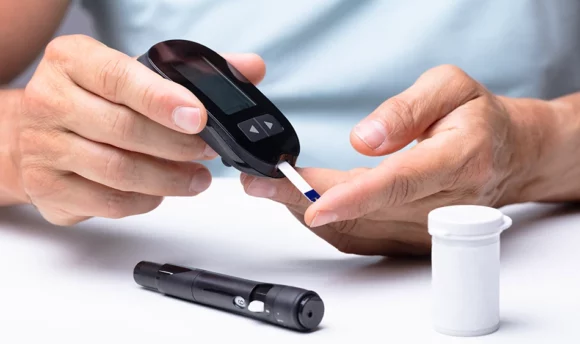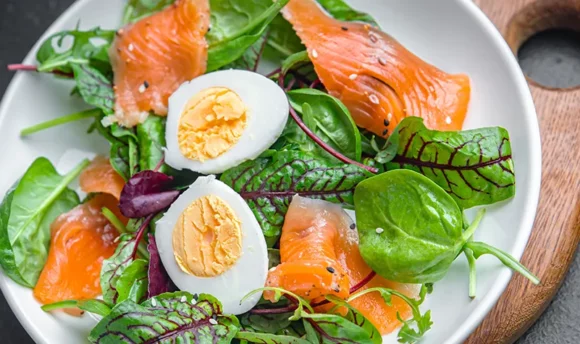Why Am I Hungry on Keto? The Great Appetite Paradox
You’ve now joined the pack of keto enthusiasts, and you’re looking forward to seeing the results. The problem is that you feel hunger all the time. Is it normal?

You’ve probably heard that the ketogenic diet can balance blood sugar, improve your focus, and provide appetite control and more energy.
Overall, keto appears to be an unmissable diet if you want to lose weight. But if it’s that simple, why isn’t everyone doing it?
Many dieters drop out despite its potential health benefits, especially when they first start keto. It demands self-discipline, strict food choices, and can trigger unpleasant symptoms (keto flu) as your body transitions.
Another common complaint is hunger pangs. You’re not the first person to feel constantly hungry on keto, and you won’t be the last to quit keto because of it.
But while common, feeling hungry isn’t a requisite of the diet. It’s about finding a balance between healthy fats, moderate protein, and few carbohydrates. With the right foods in the right amounts, you can fight hunger and enjoy the keto journey.
Let’s identify why you might feel hungry on keto so you can make some changes. We’ve also included our top tips for handling satiety in this article.
Why Am I Hungry on Keto?
Keto-eating habits are not what most of us are accustomed to. It’s an adjustment that can leave you feeling out of sorts.
It’s possible that you’re hungry on keto because you’re simply not consuming the right foods or enough calories.
And as every person has different needs, the exact requirements differ. You might need to rethink your initial keto plan by increasing your protein intake, swapping bad fats for healthy fats, and taking your carbs from nutritious sources.
Although it’s a weight-loss method, you still need adequate daily calories to reduce hunger.
What Is the Keto Diet?
Short for the ketogenic diet, the keto diet is a low-carb, high-fat diet. It’s practiced worldwide and is one of America’s favorite diets for losing weight.
When used for weight loss, the motivation is to prompt ketosis, a metabolic process triggered by a lack of carbohydrates to fuel the body. Instead of breaking down carbs into glucose, it breaks down body fat to create ketones.
The ketones are used for energy to fuel your body. Essentially, it’s a natural fat-burning technique brought on by a drastic reduction in carb consumption.
You don’t remove carbs entirely, but replace most of your carb count with lean proteins and high-fat foods.
Why Protein Is So Important on the Keto Diet
It’s all well and good watching your carbs but don’t forget about your protein intake.
Many low-carb diets insist on more protein, but too much can prevent ketosis. So, the keto diet calls for protein in moderation, typically 10–20% of your overall calorie count.
Balance is essential, as protein protects and maintains muscle tissue while facilitating ketosis. If you’re not meeting your body’s protein needs with food, it can begin sourcing protein from muscle mass, which you don’t want.
Why Should I Consume Fats?
You need to eat enough fat on keto, but we mean healthy fats, not junk.
Fat intake is a priority, as it’s where you’re going to get most of your daily calories.
It’s important because foods with a significant fat content will fill you up and keep you functioning. Dietary fat will also reduce food cravings, helping you manage your food intake, so you’re not tempted to go off-course.
Unlike many other diet trends which promote low-fat products, you can eat bacon, fatty meats, and other animal fats like lard and grass-fed butter.
Remember, certain types of fat are harmful to your health. It’s best to avoid trans fats and limit your intake of saturated fats.
Hungry on Keto? 4 Tips on How to Feel Full
Even if you’re adamant about reaching your goal weight, a severe calorie restriction isn’t always the answer. You don’t have to feel hungry on a ketogenic diet. You need to eat appetite-suppressing foods that are good for you. Here’s how to alleviate hunger pangs.
#1 Hydration is key
While the select food you eat is a primary focus, you still need to drink plenty of water to stay hydrated.
Drinking water can support your weight loss efforts, as it suppresses appetite, settles your stomach, and improves your overall wellness.
Whenever you’re tempted to reach for your favorite carb snacks, pour a glass of water instead. Sometimes, your body’s hunger signals are confused with thirst. Sip water or other low-calorie beverages to keep hunger in check throughout the day.
#2 Don’t be afraid of fats
It’s a new concept for most of us, but fats are your friend during keto.
If you’re frequently feeling hungry, you may need to eat more fat. That said, make sure it’s the good kind.
Healthful fats include olive oil, coconut oil, fatty fish, nuts, and seeds. Avoid bad fats that typically come from highly processed foods, like pizza, pastries, and sugary treats.
If you’re desperate to satisfy sugar cravings, a fat bomb makes the perfect snack. A fat bomb is a small snack loaded with fat that can instantly revive your sweet tooth while providing you with an energy blast.
There are multiple recipes online to ensure you meet your daily percentage. You could even swap breakfast for a bulletproof coffee, a coffee drink mixed with butter and MCT oil. It’s a keto favorite.
#3 Don’t forget protein-rich foods
We’ve touched on why you need protein for the ketogenic diet, so make sure you include the proper ratio in your daily consumption.
As well as protecting your muscles, protein-rich foods keep you full and provide you with essential energy without kicking you out of ketosis.
As it takes longer for protein to break down compared with carbs, it provides an energy source that lasts longer. It’s great to fuel your workouts on keto, too.
Eat lean meats, poultry, eggs, and dairy products for optimal protein.
#4 Eat low-carb veggies
Veggies are essential to any diet, whether keto or a high-carb diet.
They’re packed with vital vitamins and minerals that nourish our bodies, but the carb content varies greatly.
You need to pick low-carb vegetables to prevent throwing yourself out of ketosis. It’s best to avoid starchy vegetables like potatoes, peas, corn, and squash and focus on green leafy vegetables, celery, cucumber, and radishes.
Grocery shop wisely so that you can enjoy veggies without overconsuming net carbs.
A Word From Dietitian
The ketogenic diet is popular for a reason. It can promote weight loss, control blood sugar levels, and improve cholesterol.
It focuses heavily on a low-carb diet, with plenty of fats and a moderate protein ratio. Eating meals with low carbs is challenging for some people. It’s certainly not a suitable lifestyle choice for everyone.
It can take a few weeks to adjust to your new eating habits, but many people quit keto early because they can’t shift feeling hungry.
There are many culprits for keto hunger. You might not be getting enough fat or protein, or your calorie intake might be too low.
Fortunately, it’s easy to conquer hunger by assessing the balance between the different food groups. If you’re limiting calories, make sure you take your calories from appetite suppressing foods rich in nutrients that will benefit your health overall.
You should also prioritize getting enough sleep, drinking fluids, and limiting artificial sweeteners, which can give the body false hope when trying to combat cravings.
Conclusion
We hope this article has answered your queries about being hungry on keto.
Now you know it’s not part of the deal, you can actively practice ways to eliminate hunger as you stay on track with losing weight.
Calculate the doses of fats, protein, and carbs that work for you without breaking ketosis. Throw in optimal sleep, hydration, and supplements, and you will quickly succeed with keto.

















































 Select your language:
Select your language: 








